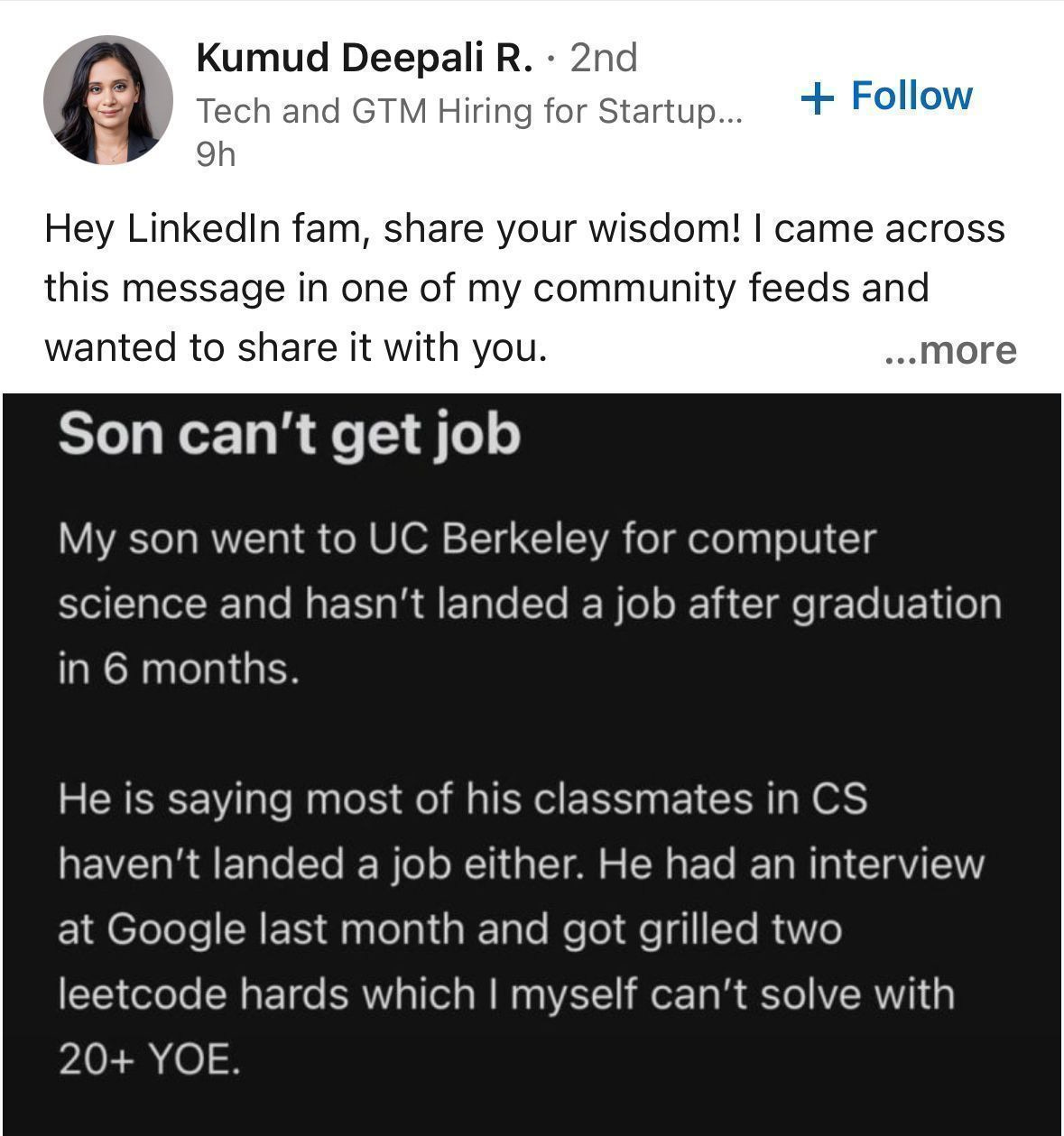Are Software Engineers in the U.S. COMPLETELY F*CKED?
AI, Offshoring, Big Tech plateauing, and content creators
To read the full article on your favourite browser, open this link.
One could argue that
The US software engineering market is officially f*cked.
For sure, in the past couple of years, it has become orders of magnitude more competitive:
Big tech companies have plateaued their growth.
AI has reduced the need for human engineers to build and ship software.
Millions of skilled engineers have been trained in countries with 2-3x lower costs than the US.
Nearly half of college graduates born between 1995-2003 studied CS or attended coding bootcamps, flooding the market with junior engineers.
Now, junior engineers in the US are competing:
Among themselves.
Against AI.
Against skilled devs from Poland, India, and beyond—for a stagnant number of jobs.
It’s a tough game, but here’s what you can do:
1️⃣ If you want a high-paying entry-level job, brace yourself to be among the best of the best.
2️⃣ If you're patient, gain experience in lower/mid-paid US jobs while living in a low-tax, low-cost location.
3️⃣ Leverage your privilege. Do things engineers from emerging markets can’t easily do:
Create content for Western audiences.
Help old US business owners modernize their operations.
4️⃣ Network like a pro. Apply with referrals whenever possible. Build your network on LinkedIn, Blind, LeetCode, Reddit, meetups—even family gatherings.
5️⃣ Create content to grow your network. Share what you’re learning in your professional journey. Post weekly or bi-weekly—keep it simple and consistent.
If you’re a junior dev from the US… Yes, the market is tough.
But:
You’ve received an education.
You live in a developed country.
You have opportunities to pivot and adapt. It’s not the end of the world—just a new game with new rules.
What if you’re in Europe, Asia or LATAM?
If you’re in Europe, things are more stable—depending on where you’re based.
Rule of thumb: The cheaper the country, the better it is for people in IT.
If you’re in an emerging market (Asia, LATAM, or Central/Eastern Europe), AI is your main competition.
But you can turn it into your advantage:
Use it to learn faster and stay ahead.
Leverage it to work smarter and deliver better results.
Explore freelancing or consulting to build software for clients.
Create micro-SaaS side hustles.
The US used to have a clear edge over Europe for devs.
In some ways, it still does:
There are more high-paying jobs in the US.
But the gap is tightening.
Junior devs in the US are struggling like never before.
Meanwhile, Europe, Asia, and LATAM are seeing steady growth in tech opportunities.
Check:
Working from Europe for a US company is the ultimate career and lifestyle hack
Is Europe better than the U.S. for Software Engineers in 2024?
Humanistic revolutions - What if the future isn’t for STEM grads but for the creatives?
Wild guess, but let’s explore it.
I grew up believing that “creative careers” weren’t economically viable.
During my first year of B.Eng., I told my mom how boring and useless I found my degree.
She asked: "What do you want to do then?"
My ideas were:
Computer Science
Math
Cinema
But the third option? I had to quickly discard it after she said:
“If you want to study cinema, you’ll have to find a job to support your studies, because I’m not paying for that.”
She loves cinema, but like many, she didn’t think it was a viable career.
Fast forward to today:
Imagine being highly skilled in the tools and techniques for professional video creation, alongside a strong education in cinematic arts, communication, and history.
It’s clear how that could be an easy-to-monetize skill with incredible upside potential.
As technology evolves and AI continues to automate the world, creative talent is becoming increasingly valuable.
To me, this is amazing.
We’re automating the boring, repetitive, and dehumanizing parts of work—making more space and value for the creative and humanizing ones.
This is an incredible outcome of technological progress.
There’s never been a better time in history to invest in your creative self!
Do you agree?
Whenever you're ready, there are 2 ways I can help you:
Euro Top Tech Jobs: 4000+ top paying tech jobs in Europe in addition to 90+ fully-remote companies paying $100-600k per year and private guides like this one.
Coaching Program: Check it out if you want to work 1:1 with me to boost your career as a dev in Europe or remote.





“ AI has reduced the need for human engineers to build and ship software.”
I still can’t believe that someone believes in these statements! If you really think about what is AI actually doing in a sense of giving an answer to your question, your statement fails completely. Do you really think that because of AI there are less sw jobs in the market…?